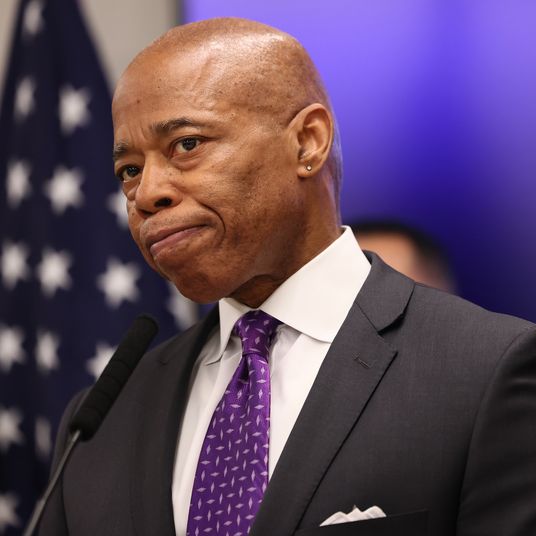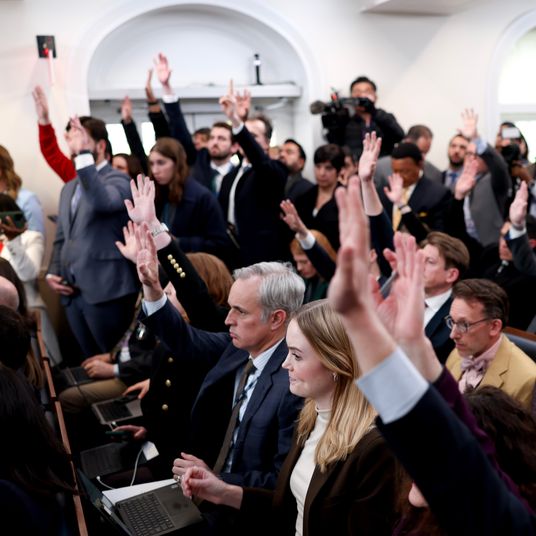
Intelligencer staffers Jonathan Chait, Benjamin Hart, and Eric Levitz talk about the Republican hesitance to reckon with white nationalism.
Ben: Jon, you wrote today that beyond President Trump, “a certain softness about white-supremacist terror is official Republican doctrine.” We know that Trump’s rhetoric and ideas align quite nicely with those of white nationalists, but this weekend we also saw a prominent congressman (Dan Crenshaw) and senator (Ted Cruz) using the Trumpian strategy of going after the left in the wake of the California synagogue shooting, as if to deflect any responsibility the party might bear here. Is the modern-day GOP simply incapable of acknowledging a possible link between its drift into nativism and intolerance and violent incidents in the real world?
Jon: Yes, I think the modern right is incapable of conceding any error of ideological excess whatsoever. That is, to the extent they can engage in self-criticism, it’s restricted to “we lost our way,” i.e., spent too much, failed to uphold the sacred doctrine with enough rigor, etc. They can denounce white-supremacist terror, but cannot connect it to conservative politics or action.
Eric: I think it also is incapable in a more concrete sense: Stoking panic about immigration-fueled demographic change is now the party’s primary base-mobilization strategy.
Fox News guests accuse the Democrats of trying to orchestrate an invasion of Central American immigrants, so as to permanently wrest power from the white majority, on a regular basis. Trump has personally referenced this idea several times. One of his former advisers wrote a highbrow essay on similar themes during the 2016 election. The distinction between “Democrats like George Soros are trying to make it impossible for real Americans to rule this country democratically by flooding it with immigrants” and “Jews like George Soros are trying to make it impossible for white Americans to rule this country democratically by flooding it with immigrants” isn’t that big.
Ben: Do you feel that Democrats, and those on the left generally, are being too timid in making a connection between extremist violence and right-wing politics?
Jon: As a matter of political strategy? Or the moral need to speak out?
Ben: Both!
Jon: Morally, I’m not sure if it’s helpful to the cause to connect it to conservative politics — that might simply drive more conservatives toward white-supremacist subcultures via polarization. Politically, I’m also unsure. Chats always bring out my lukewarm takes.
Ben: Haha.
Eric: I mean, I think spotlighting the fact that the president and his allies are propagating a demonstrably false conspiracy theory — which white-nationalist terrorists subscribe to with only minor revisions — seems worthwhile. You don’t need to claim that favoring restrictive immigration policies or supporting Trump is indistinguishable from white nationalism. But I don’t really see the moral or political problem with loudly condemning the president for telling lies that white nationalists believe. The equation is between a mendacious messaging technique and white-nationalist orthodoxy, not between all of conservatism and the latter.
Jon: I think there’s political value in making white-supremacist violence a Republican problem they feel pressured to answer for, which could in theory force them to take more responsible positions.
Ben: Though, to be fair, this latest shooter disliked Trump, as did the Pittsburgh synagogue shooter. It’s easy to imagine Republicans spinning the incoherence of these people’s positions into “Look, they’re crazy and there’s nothing we can do.”
Jon: That’s also their position on Trump.
Eric: To me, the answer is the message: “Saying that George Soros is trying to steal elections for Democrats by orchestrating migrant caravans was indefensible before these shootings happened. But maybe now you can see why these lies are even more indefensible than those Trump typically tells, and will thus do something about it.”
Last week, Glenn Beck went on Sean Hannity’s show and literally accused a specific religious institution of working with Soros to ship migrants across the border. It wasn’t a Jewish one. But I personally don’t want white nationalists killing people of any faith to make America great again.
Ben: Controversial take from Eric.
Jon: Yeah, that’s not the official editorial line here at New York, but we let our writers express idiosyncratic opinions.
Ben: The new right-wing playbook seems to be to blame IIhan Omar for all of the country’s intolerance. Our colleague Sarah Jones has argued that Democrats have not done a good job defending her from attacks that are increasingly untethered from reality. Have they unwittingly created an opening for conservatives to exploit when they want to distract people from their own possible complicity?
Eric: I think that opening would exist either way.
Jon: I agree, and the issue is that Sarah and I don’t agree on whether Omar’s comments merited a defense or not.
Eric: Well, I think we all agree that the Democrats did a shamefully poor job of defending her against the 9/11 smear.
Jon: Yes.
Ben: But ultimately, Republicans will find a way to deflect blame and attack the left. If we’ve learned nothing else, we’ve learned that.
Jon: The Republicans just have a larger and more effective partisan message machine, so they can exploit that in almost every opportunity, including making a relatively small problem like Omar’s anti-Semitism seem larger than a huge problem — the Republican Party’s rampant bigotry.
Eric: It’s crazy that they don’t even need to deflect from their intransigence on gun control anymore, or at least in this context. In addition to spreading hateful conspiracy theories that white-nationalist terrorists believe in, they are also doing their darnedest to ensure that said terrorists have access to AR-15s. But the New York Times did a bad cartoon, so the left should feel pretty ashamed of itself right now.





























